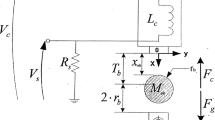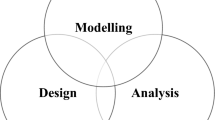Abstract
This article introduces the robust-optimal control design for the current-controlled electromagnetic levitation system (CC-EMLS). Because of the uncertain nature of the electromagnetic levitation system, it is essential to propose a robust regulator such that it will handle the system’s uncertainties. The dynamics of CC-EMLS are transformed in terms of the unmatched input uncertainty. The robust control issue in terms of uncertainties is reflected in the cost function, which is translated and solved using the optimal control problem. The controller developed using the optimal control method for the electromagnetic levitation system becomes the solution to the robust control problem to handle the uncertainties of the system. The Lyapunov stability theorem is used to establish the required stability proof. A simulation results demonstrates the proposed controller’s effectiveness, robustness, and efficiency. The integral error indices such as integral absolute error, integral square error, integral time absolute error, and integral time square error, are calculated to validate the effectiveness of the designed regulator.









Similar content being viewed by others
Availability of data and materials
Not applicable.
References
Wai RJ, Lee JD (2008) Robust levitation control for linear maglev rail system using fuzzy neural network. IEEE Trans Control Syst Technol 17(1):4–14
Sun Y, Xu J, Qiang H, Lin G (2019) Adaptive neural-fuzzy robust position control scheme for maglev train systems with experimental verification. IEEE Trans Industr Electron 66(11):8589–99
Zhai M, Long Z, Li X (2019) A new strategy for improving the tracking performance of magnetic levitation system in maglev train. Symmetry 11(8):1053
Li G, Wang X, Cui P, Li J (2019) Analysis of superconducting linear synchronous motor for electromagnetic propulsion. Clust Comput 22:2709–17
Yu Y, Sun X, Zhang W (2017) Modeling and decoupling control for rotor system in magnetic levitation wind turbine. IEEE Access 27(5):15516–28
Hemenway NR, Gjemdal H, Severson EL (2019) Magnetic bearing technology for industrial bearingless motor systems. In: 2019 IEEE Workshop on Electrical Machines Design, Control and Diagnosis (WEMDCD), vol 1. IEEE, pp 51–58
Chen C, Xu J, Ji W, Rong L, Lin G (2019) Sliding mode robust adaptive control of maglev vehicle’s nonlinear suspension system based on flexible track: Design and experiment. IEEE Access. 19(7):41874–84
Sun N, Fang Y, Chen H (2017) Tracking control for magnetic-suspension systems with online unknown mass identification. Control Eng Pract 1(58):242–53
Ginoya D, Gutte CM, Shendge PD, Phadke SB (2016) State-and-disturbance-observer-based sliding mode control of magnetic levitation systems. Trans Inst Meas Control 38(6):751–63
Zhao D, Li S, Zhu Q, Gao F (2010) Robust finite-time control approach for robotic manipulators. IET Control Theory Appl 4(1):1–5
Malik AS, Ahmad I, Rahman AU, Islam Y (2019) Integral backstep** and synergetic control of magnetic levitation system. IEEE Access 8(7):173230–9
Yaseen HM, Siffat SA, Ahmad I, Malik AS (2022) Nonlinear adaptive control of magnetic levitation system using terminal sliding mode and integral backstep** sliding mode controllers. ISA Trans 1(126):121–33
Park Y (2014) Design and implementation of an electromagnetic levitation system for active magnetic bearing wheels. IET Control Theory Appl 8(2):139–48
Anantachaisilp P, Lin Z (2017) Fractional order PID control of rotor suspension by active magnetic bearings. In: Actuators, vol 6, No. 1. MDPI, p 4
ElSinawi AH, Emam S (2011) Dual LQG-PID control of a highly nonlinear magnetic levitation system. In: 2011 Fourth International Conference on Modeling, Simulation and Applied Optimization. IEEE, pp 1–4
Ni F, Zheng Q, Xu J, Lin G (2019) Nonlinear control of a magnetic levitation system based on coordinate transformations. IEEE Access 11(7):164444–52
Khan M, Siddiqui AS, Mahmoud AS (2018) Robust H-infinity control of magnetic levitation system based on parallel distributed compensator. Ain Shams Eng J 9(4):1119–29
Santim M, Teixeira M, Souza WA, Cardim R, Assuncao E (2012) Design of a Takagi-Sugeno fuzzy regulator for a set of operation points. Math Probl Eng 1:2012
Utkin VI (2013) Sliding modes in control and optimization. Springer, New York
Pérez-Ventura U, Fridman L (2020) Chattering comparison between continuous and discontinuous sliding-mode controllers. From Theory to Practice, Variable-Structure Systems and Sliding-Mode Control, pp 197–211
Chenarani H, Fateh MM (2023) Robust passivity-based sliding mode control of a large class of nonlinear systems subject to unmatched uncertainties: a robot manipulator case study. IETE J Res 69(7):4394–403
Chenarani H, Binazadeh T (2017) Flexible structure control of unmatched uncertain nonlinear systems via passivity-based sliding mode technique. Iran J Sci Technol Trans Electr Eng 41:1–1
Shieh HJ, Siao JH, Liu YC (2010) A robust optimal sliding-mode control approach for magnetic levitation systems. Asian J Control 12(4):480–7
Mourad A, Youcef Z (2022) Adaptive sliding mode control improved by fuzzy-PI controller: applied to magnetic levitation system. Eng Proc 14(1):14
Kumar EV, Jerome J (2013) LQR based optimal tuning of PID controller for trajectory tracking of magnetic levitation system. Procedia Eng 1(64):254–64
Majewski P, Pawuś D, Szurpicki K, Hunek WP (2022) Toward optimal control of a multivariable magnetic levitation system. Appl Sci 12(2):674
Benomair AM, Bashir FA, Tokhi MO (2015) Optimal control based LQR-feedback linearisation for magnetic levitation using improved spiral dynamic algorithm. In: 2015 20th International Conference on Methods and Models in Automation and Robotics (MMAR). IEEE, pp 558–562
Gandhi RV, Adhyaru DM (2018) Novel approximation-based dynamical modelling and nonlinear control of electromagnetic levitation system. Int J Comput Syst Eng 4(4):224–37
Tran AT, Suzuki S, Sakamoto N (2017) Nonlinear optimal control design considering a class of system constraints with validation on a magnetic levitation system. IEEE Control Syst Lett 1(2):418–23
Pandey A, Adhyaru DM (2023) Control techniques for electromagnetic levitation system: A literature review. Int J Dynam Control 11(1):441–51
Acknowledgements
The manuscript discussed is a part of the full-time Ph.D. programme offered by the Institute of Technology, Nirma University, Ahmedabad, Gujarat, India.
Funding
No funding is provided.
Author information
Authors and Affiliations
Contributions
Both the authors have equally contributed
Corresponding author
Ethics declarations
Code availability
Not applicable.
Conflict of interest
The authors declare that there is no conflict of interest in the publication of this article.
Rights and permissions
Springer Nature or its licensor (e.g. a society or other partner) holds exclusive rights to this article under a publishing agreement with the author(s) or other rightsholder(s); author self-archiving of the accepted manuscript version of this article is solely governed by the terms of such publishing agreement and applicable law.
About this article
Cite this article
Pandey, A., Adhyaru, D.M. Robust-optimal control design for current-controlled electromagnetic levitation system with unmatched input uncertainty. Int. J. Dynam. Control (2024). https://doi.org/10.1007/s40435-024-01412-9
Received:
Revised:
Accepted:
Published:
DOI: https://doi.org/10.1007/s40435-024-01412-9




